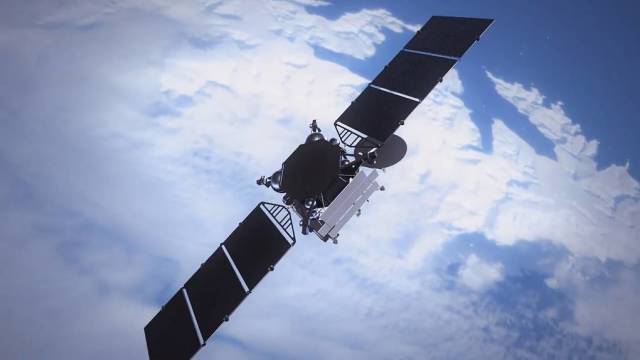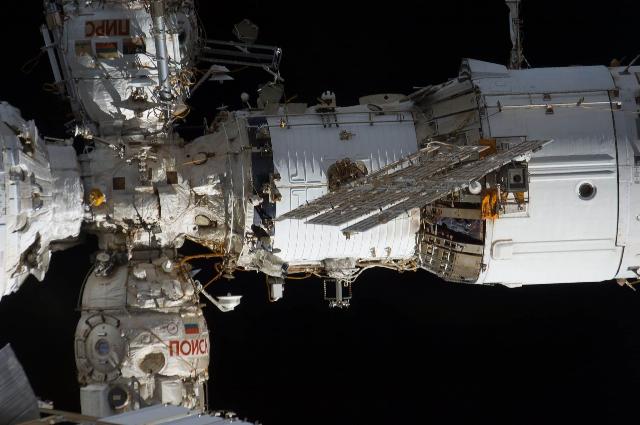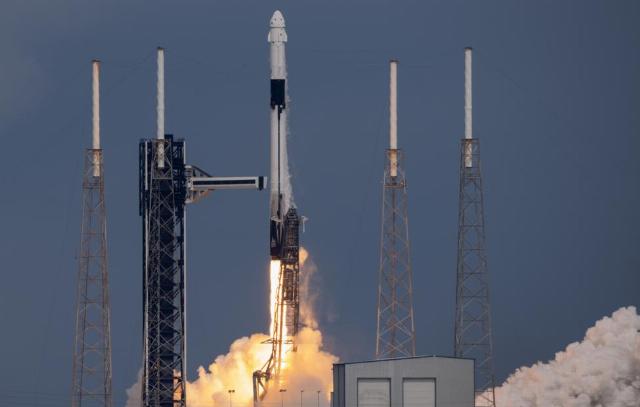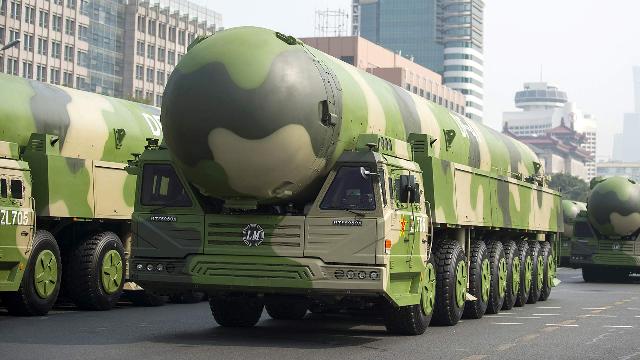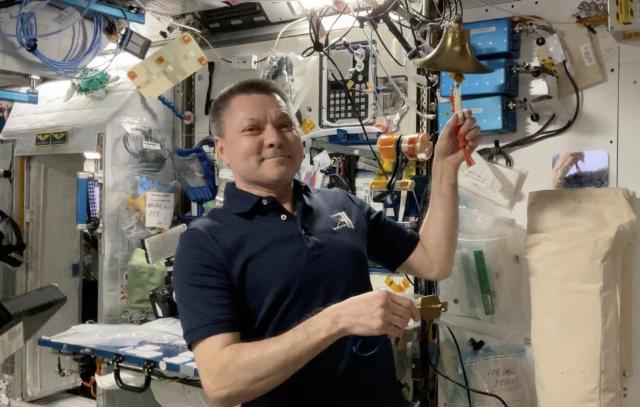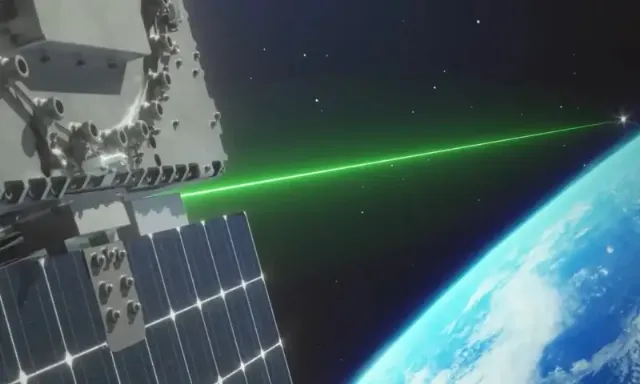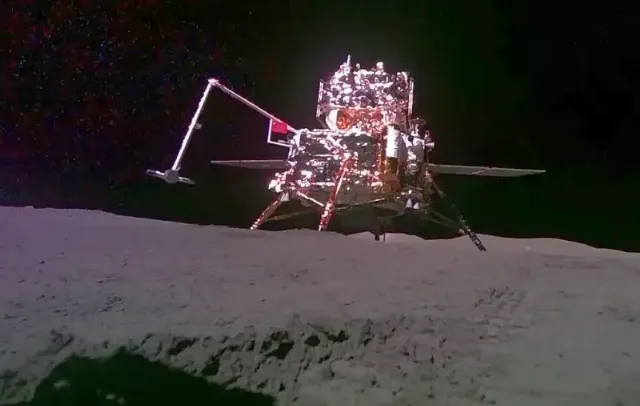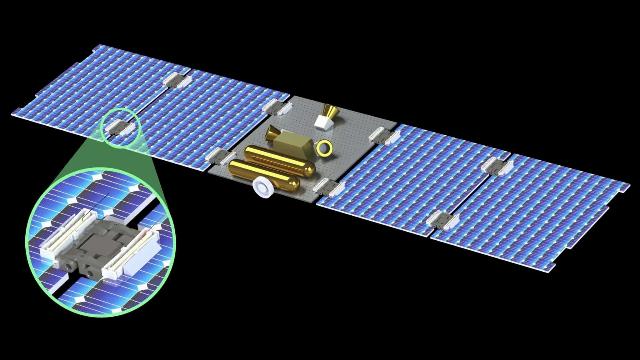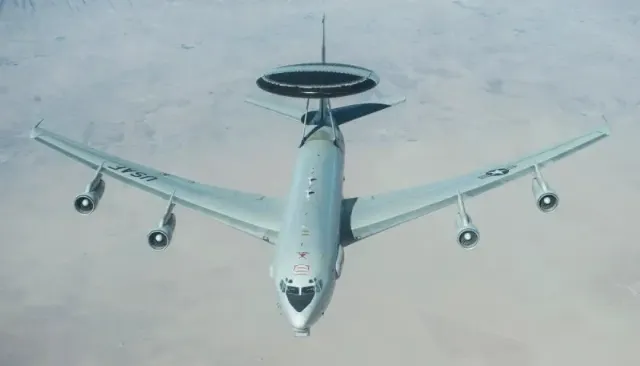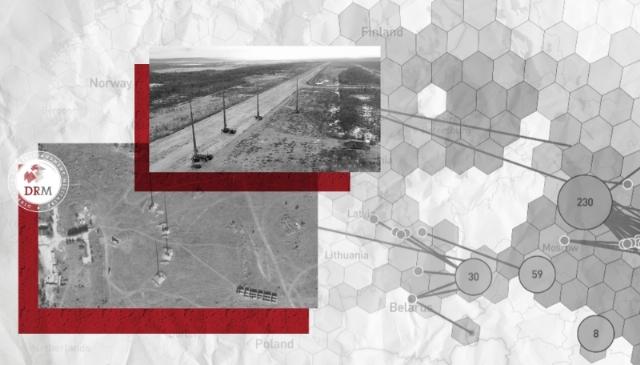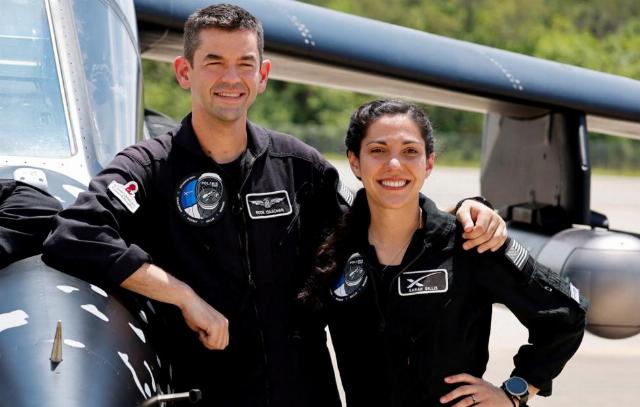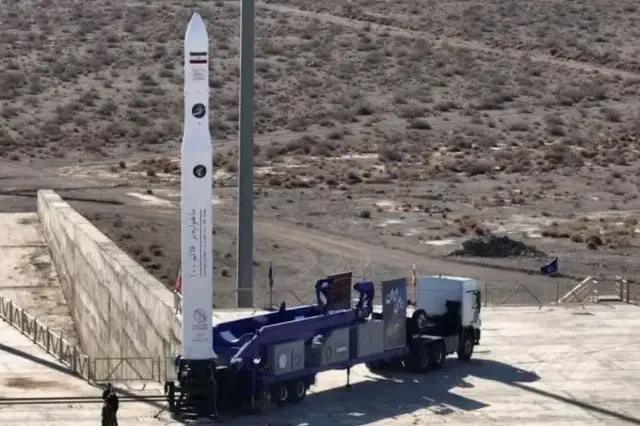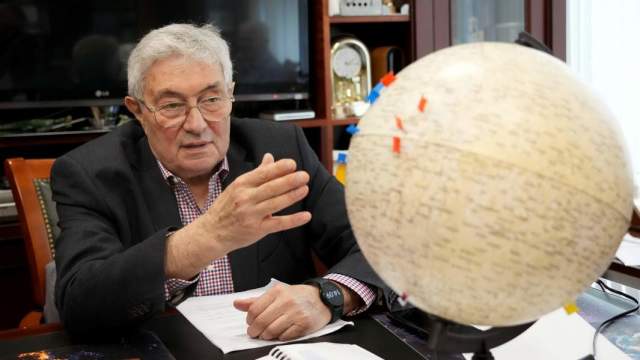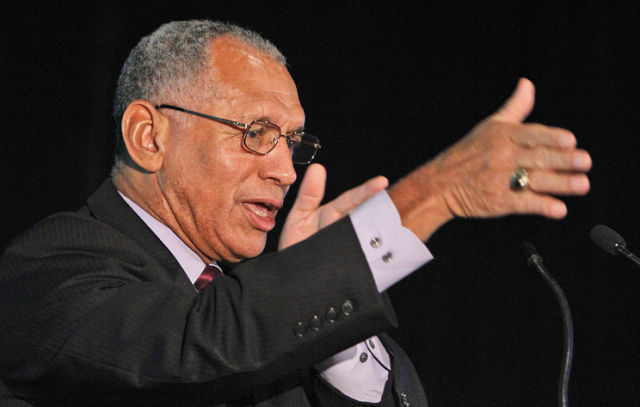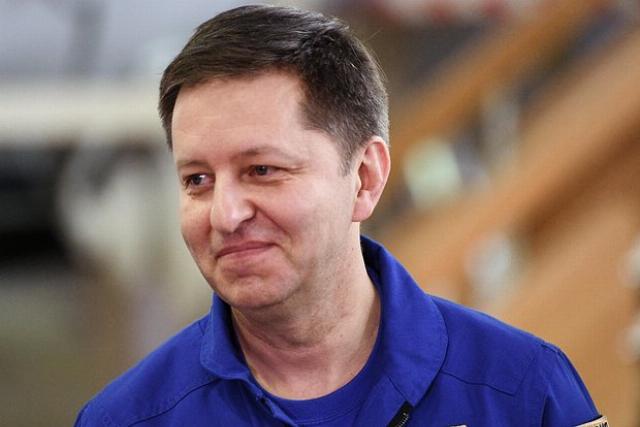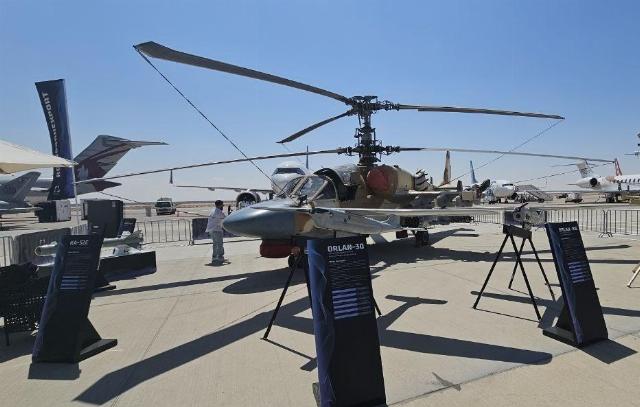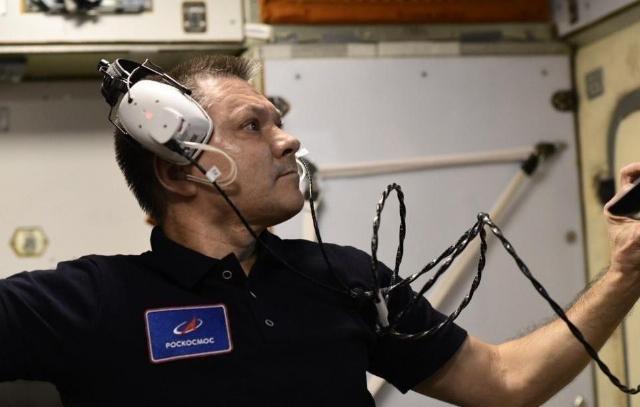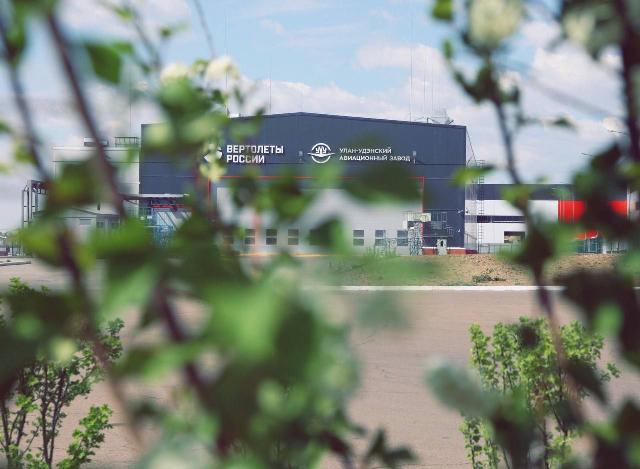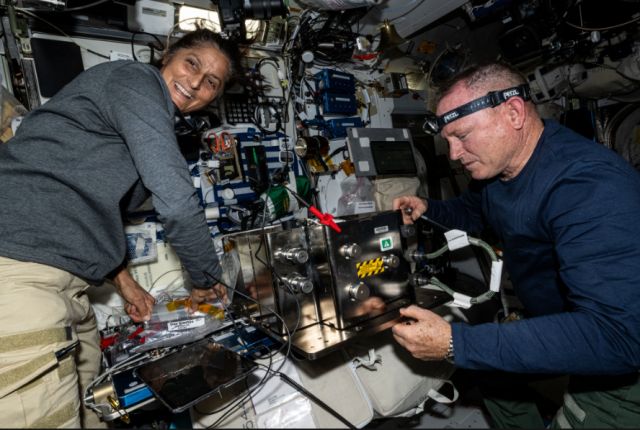Latest news on "Space"
The Russian Federation plans to launch a series of new satellites for Earth sensing from 2025 to 2034
The Arktika-MP spacecraft will be the first to launch, which will provide hydrometeorological information, including weather forecasts on a regional and global scale
From 2025 to 2034, Russia plans to launch a series of hydrometeorological satellites for remote sensing of the Earth, in particular the Arctic region. This was announced by Sergey Zaitsev, Director of the Department of Scientific and Technical Projects of the Roscosmos State Corporation, at the Presidium of the Russian Academy of Sciences.
The air leak on the ISS has reached the maximum risk level. But NASA urges not to panic
The International Space Station, even in fully operational condition, is constantly losing air. Normally, the leakage value should not exceed 270 grams per day. But in April 2024, the station lost 1.6 kilograms of its atmosphere every day — almost six times more than allowed. According to NASA's internal estimates, the situation has reached a critical level. At the same time, in the public space, the agency adheres to optimistic rhetoric and tries to present the colossal leak as something only moderately disturbing.
SpaceX's Crew-9 mission to the ISS
On September 28, the Crew Dragon manned spacecraft was launched using a Falcon 9 launch vehicle
TASS-DOSSIER. On September 28, 2024, at 20:17 Moscow time, the American company SpaceX launched from the Cape Canaveral cosmodrome (state Florida, USA) the Crew Dragon manned spacecraft using the Falcon 9 launch vehicle. Participants of the Crew-9 work mission - Russian cosmonaut Alexander Gorbunov and American astronaut Nick Hague - went to the International Space Station (ISS).
Chinese Anticipation: how China's intercontinental missiles are developing
The Celestial Empire has products capable of achieving goals in Europe, Asia and the USA
This week, China tested an intercontinental ballistic missile with a maximum-range launch into the Pacific Ocean. We are used to the fact that China is the world's third nuclear power, which has long—range means of delivering nuclear charges, but with a large gap between Russia and the United States in their number. However, the arsenal of this country is growing. Izvestia is about what kind of intercontinental missiles modern China possesses and what it may have in development.
What is known about the records of manned space exploration
On September 23, 2024, after returning to Earth on the Soyuz MS-25 spacecraft, Roscosmos cosmonaut Oleg Kononenko became the new world record holder for the total time spent in space
On September 23, 2024, after returning to Earth on the Soyuz MS-25 spacecraft, Roscosmos cosmonaut Oleg Kononenko became the new world record holder for the total time spent in space. During five orbital missions, he flew 1,111 days.
Disable enemy satellites: France has introduced the concept of the TOUTATIS space defense system
The Chief of Staff of the French Air and Space Forces, General Stephane Mill, pointed to the growing number of "rendezvous between objects" in all orbits, which requires the development of active defense capabilities.
For the first time in history, Chinese scientists have revealed what the soil on the far side of the moon consists of
For the first time in history, Chinese scientists have revealed what kind of material is on the far side of the moon. Soil and rock samples from a previously unexplored part of the Earth's natural satellite were delivered during the mission of the Chinese Chang'e-6 automatic station. The mission lasted 53 days from launch on May 3, 2024 to landing in Inner Mongolia in the north of China on June 25, 2024.
Samara Aerospace will test a "flapping wings" satellite
There are not many ways to change the orientation of a spacecraft in space, all of them are well known in the industry and have long been tested by practice. And given the peculiarities of movement in space, it seems that it is almost impossible to invent something new to accomplish this task. Nevertheless, in the coming years, a satellite with a previously unseen precise orientation mechanism will appear in low-Earth orbit: it will literally wave its solar panels to turn around.
AWACS off-board system: an American company offers to unload AWACS aircraft from equipment
The United States currently uses AWACS heavy-duty aircraft equipped with a large crew and a range of equipment and computers for reconnaissance and combat control. The American company Northrop Grumman has proposed a way to do most of the coordination and calculations away from the vulnerable sky.
French military intelligence expects OSINT to help track Russian electronic warfare systems
The French online newsletter Intelligence Online criticized the interesting material "Military intelligence agency looks to OSINT to help track Russian interception systems" ("Military intelligence expects OSINT to help track Russian electronic interception systems"), which states that monitoring of constantly improving new Russian electronic warfare complexes on the line of contact of the parties has crucial for Western military intelligence. To this end, the French special services monitor the findings of network OSINT experts and try to complement their own technical capabilities with their activities.
Legs here, and hands there: what is remarkable about the spacewalk of non-professionals - Opinions of TASS
Mikhail Kotov — about the first private spacewalk and its features
Two crew members of the Polaris Dawn mission made the first ever private spacewalk yesterday, September 12. Businessman Jared Isaacman and engineer Sarah Gillis in SpaceX spacesuits took turns partially leaving the Crew Dragon spacecraft for several minutes.
Iran has successfully launched the Chamran-1 research satellite into orbit
The Islamic Revolutionary Guard Corps (IRGC) The Islamic Republic of Iran has successfully launched the Chamran-1 research satellite into orbit. It will be used to test software and hardware for testing orbital maneuvering technology.
Academician Lev Zeleny: humanity has begun an active expansion to the Moon - TASS interview
The scientific director of the Space Research Institute (IKI) of the Russian Academy of Sciences, the scientific director of the first stage of the lunar program (research by automatic stations), spoke about the scientific value of the first lunar missions, various approaches to the study of the natural satellite of the Earth, as well as the current state of the Russian lunar program in an interview with TASS academician Lev Zeleny.
Expert: the US Space Development Agency has started having problems with suppliers
Private space contractors from the defense industry cannot cope with the ambitions of the Pentagon, and the trade war launched by Washington with China seems to have its negative consequences for the national space industry of the United States, military expert Alexander Stepanov noted.
Ex-NASA Director Charles Bolden: I am a constant optimist and believe that space brings peoples closer together - TASS interview
Former American astronaut, head of NASA in the Barack Obama administration (2009-2017), Major General of the US Marine Corps Charles Bolden, in an interview with TASS, assessed the prospects for cooperation between the United States and Russia in space exploration, shared memories of a joint shuttle flight with Sergei Krikalev in 1994, commented on plans for landing people on the Moon and Mars.
The cosmonaut had been preparing for flight for 14 years, but remained on Earth because of the film "The Challenge". Now they want to fire him because of a cold
"Newspaper.<url>" announced the dismissal of cosmonaut Babkin, who did not fly to the ISS
Andrey Babkin, a member of the cosmonaut squadron, was offered to resign from his flight position for health reasons. It is claimed that the main cause is a runny nose. At the same time, another reason is the desire of Roscosmos to save money on its preparation, compensating for the budget deficit.
With an eye on Africa and the Middle East: what kind of weapons does Russia offer in Egypt
The Egypt International Airshow 2024 International Aviation and Space Salon is taking place at the airport of the city of El Alamein, on the Mediterranean coast, 270 km from the capital of the country. The event is taking place for the first time. According to the Egyptian State Information Service, representatives of more than 100 countries and over 300 aerospace enterprises are taking part in the air show, and on the first day of its work, President of the Arab Republic of Egypt Abdel Fattah al-Sisi visited it.
The record-breaking cosmonaut is preparing to return to Earth. What you need to know about Oleg Kononenko
Oleg Kononenko has been making his fifth space flight since September 15, 2023. The commander of the ISS-70/71 expedition launched on the Soyuz MS-24 spacecraft together with Nikolai Chub and American Loral O'Hara. February 4 (11:30 Moscow time) Kononenko became the new holder of the world record for total stay in orbit. Since 2015, the previous record has been held by another Russian cosmonaut, Gennady Padalka, who spent a total of 878 days, 11 hours, 29 minutes, 48 seconds in space during five missions (from 1998 to 2015).
U-UAZ helicopters and airplanes
Ulan-Ude Aviation Plant (U-UAZ), celebrating its 85th anniversary on September 1, is a unique enterprise with competencies in the production of both aircraft and helicopters. Today, the equipment of the plant, which is part of the Rostec structure, is supplied to both Russian and foreign customers in more than 40 countries. The main activity of U-UAZ is the production and modernization of Mi-8/17 series helicopters.
Nine months instead of eight days: how American astronauts became trapped on the ISS - TASS Opinions
The return of astronauts stranded on the International Space Station is expected no earlier than February 2025, director of the US National Aeronautics and Space Administration Bill Nelson said on August 24.




